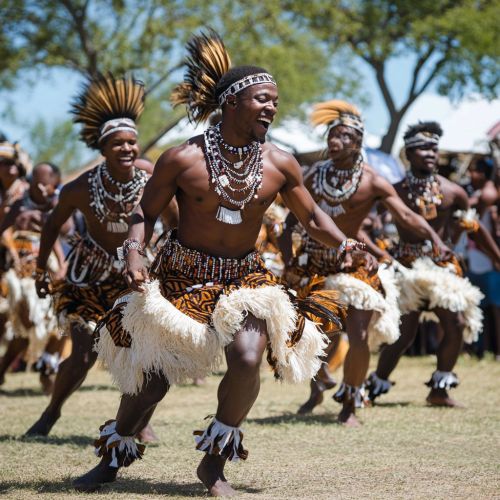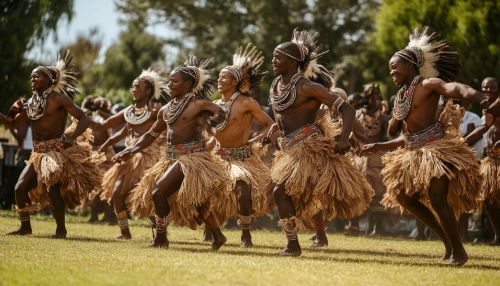Zulu: Difference between revisions
(Created page with "== Introduction == The Zulu people are a Bantu ethnic group primarily found in the province of KwaZulu-Natal in South Africa. They are the largest ethnic group in South Africa, with a rich history and cultural heritage that has significantly influenced the region. The Zulu language, isiZulu, is part of the Nguni subgroup of the Bantu languages and is widely spoken throughout South Africa. The Zulu nation rose to prominence under the leadership of King Shaka Zulu in the...") |
No edit summary |
||
| Line 41: | Line 41: | ||
Zulu arts and crafts are renowned for their intricate beadwork, basketry, and pottery. Beadwork, in particular, holds cultural significance, with colors and patterns conveying messages and social status. Traditional Zulu music and dance are integral to cultural ceremonies and celebrations, featuring rhythmic drumming and energetic movements. | Zulu arts and crafts are renowned for their intricate beadwork, basketry, and pottery. Beadwork, in particular, holds cultural significance, with colors and patterns conveying messages and social status. Traditional Zulu music and dance are integral to cultural ceremonies and celebrations, featuring rhythmic drumming and energetic movements. | ||
[[Image:Detail-98423.jpg|thumb|center|Zulu dancers performing in traditional attire during a cultural festival.|class=only_on_mobile]] | |||
[[Image:Detail-98424.jpg|thumb|center|Zulu dancers performing in traditional attire during a cultural festival.|class=only_on_desktop]] | |||
== Modern Zulu Society == | == Modern Zulu Society == | ||
Latest revision as of 23:23, 10 October 2024
Introduction
The Zulu people are a Bantu ethnic group primarily found in the province of KwaZulu-Natal in South Africa. They are the largest ethnic group in South Africa, with a rich history and cultural heritage that has significantly influenced the region. The Zulu language, isiZulu, is part of the Nguni subgroup of the Bantu languages and is widely spoken throughout South Africa. The Zulu nation rose to prominence under the leadership of King Shaka Zulu in the early 19th century, who is renowned for his military innovations and unification of various clans into a formidable kingdom.
Historical Background
Early History
The origins of the Zulu people can be traced back to the Nguni migrations, which occurred over several centuries. The Nguni people, including the Zulu, migrated southward from the Great Lakes region of Africa, settling in what is now South Africa. The Zulu were originally a minor clan in the region, but their influence grew significantly under the leadership of Shaka Zulu.
Shaka Zulu and the Rise of the Zulu Kingdom
Shaka Zulu, born around 1787, was a pivotal figure in the history of the Zulu people. He became chief of the Zulu clan in 1816 and implemented a series of military and social reforms that transformed the Zulu into a powerful kingdom. Shaka introduced new tactics and weaponry, such as the short stabbing spear, known as the iklwa, and the large cowhide shield. His military strategies, including the famous "bull horn" formation, allowed the Zulu to conquer and assimilate neighboring tribes, expanding their territory significantly.
Shaka's reign was marked by both military success and internal strife. His leadership style was often harsh, and his campaigns led to widespread displacement and upheaval, known as the Mfecane, affecting much of southern Africa. Despite this, Shaka's legacy as a military innovator and nation-builder remains influential.
The Anglo-Zulu War
The Anglo-Zulu War of 1879 was a significant conflict between the British Empire and the Zulu Kingdom. The war was precipitated by British colonial ambitions in southern Africa and their desire to control the Zulu territory. The Zulu, under the leadership of King Cetshwayo, initially achieved a stunning victory at the Battle of Isandlwana, where they defeated a well-equipped British force.
However, the British regrouped and eventually defeated the Zulu at the Battle of Ulundi, leading to the annexation of the Zulu Kingdom. The war had a profound impact on the Zulu people, resulting in the loss of their independence and the fragmentation of their society.
Culture and Society
Social Structure
Zulu society is traditionally organized into a hierarchical structure, with the king or chief at the top, followed by a council of elders, and then the common people. The family unit, or umndeni, is the basic social structure, with extended families living together in homesteads known as umuzi. The Zulu practice a patrilineal system of inheritance, where property and leadership are passed down through the male line.
Language
The Zulu language, isiZulu, is a member of the Nguni language family and is one of the 11 official languages of South Africa. It is characterized by its use of click consonants, a feature shared with other Nguni languages such as Xhosa. IsiZulu is spoken by over 12 million people and serves as a lingua franca in many parts of South Africa.
Religion and Beliefs
Traditional Zulu religion is centered around ancestor worship and the belief in a supreme being known as Unkulunkulu. Ancestors, or amadlozi, are believed to play an active role in the lives of the living, providing guidance and protection. Rituals and ceremonies are conducted to honor the ancestors and seek their favor.
With the arrival of European missionaries, Christianity has also become a significant religious influence among the Zulu. Today, many Zulu people practice a syncretic blend of traditional beliefs and Christianity.
Arts and Crafts
Zulu arts and crafts are renowned for their intricate beadwork, basketry, and pottery. Beadwork, in particular, holds cultural significance, with colors and patterns conveying messages and social status. Traditional Zulu music and dance are integral to cultural ceremonies and celebrations, featuring rhythmic drumming and energetic movements.


Modern Zulu Society
Political Influence
In contemporary South Africa, the Zulu people play a significant role in the country's political landscape. The Inkatha Freedom Party, founded by Mangosuthu Buthelezi, has been a prominent political force, advocating for the rights and interests of the Zulu people. The party has been influential in the politics of KwaZulu-Natal and has participated in national governance.
Economic Contributions
The Zulu people contribute to various sectors of the South African economy, including agriculture, mining, and tourism. KwaZulu-Natal, the heartland of the Zulu nation, is a major agricultural region, producing sugarcane, maize, and other crops. The province's natural beauty and cultural heritage also make it a popular tourist destination.
Challenges and Opportunities
Despite their cultural and economic contributions, the Zulu people face several challenges, including poverty, unemployment, and access to education. Efforts to address these issues include government initiatives and community-based programs aimed at improving living standards and preserving cultural heritage.
